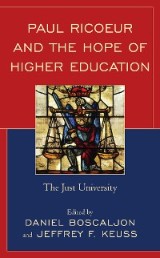Details

Paul Ricoeur and the Hope of Higher Education
The Just UniversityStudies in the Thought of Paul Ricoeur
|
44,99 € |
|
| Verlag: | Lexington Books |
| Format: | EPUB |
| Veröffentl.: | 14.01.2021 |
| ISBN/EAN: | 9781793638274 |
| Sprache: | englisch |
| Anzahl Seiten: | 346 |
DRM-geschütztes eBook, Sie benötigen z.B. Adobe Digital Editions und eine Adobe ID zum Lesen.
Beschreibungen
<p><span>The essays in </span><span>Paul Ricoeur and the Hope of Higher Education: The Just University</span><span> discuss diverse ways that Paul Ricoeur’s work provides hopeful insight and necessary provocation that should inform the task and mission of the modern university in the changing landscape of Higher Education. This volume gathers interdisciplinary scholars seeking to reestablish the place of justice as the central function of higher education in the twenty-first century. The contributors represent diverse backgrounds, including teachers, scholars, and administrators from R1 institutions, seminary and divinity schools as well as undergraduate teaching colleges. This collection, edited by Daniel Boscaljon and Jeffrey F. Keuss, offers critical and practical visions for the renewal of higher education. The first part of the book provides an internal examination of the university system and details how Ricoeur’s thinking assists on pragmatics from syllabus design to final exams to daily teaching. The second portion of the book examines the Just University’s role as a social institution within the broader cultural world and looks at how Ricoeur’s description of values informs how the university works relative to religious belief, prisons, and rural poverty.</span></p>
<p><span>The stresses of the twenty-first century have exposed the fault lines in Higher Education, both as an instructional space that facilitates student growth and as a social space that shapes our economic, political, and religious institutions. This book uses Paul Ricoeur’s rigorous writings to envision a Just University necessary for the years ahead.</span></p>
<p><span>List of Figures and Tables</span></p>
<p><span>Preface: Dreaming of the Just University in an Age of Crisis</span></p>
<p><span>Daniel Boscaljon and Jeffrey F. Keuss</span></p>
<p><span>Introduction: Paul Ricoeur and the Hope of a Just University</span></p>
<p><span>Daniel Boscaljon and Jeffrey F. Keuss</span></p>
<p><span>Part 1: The Just University as Instructional Space</span></p>
<p><span>Chapter 1: The Agon of the Summoned Self in Ricoeur’s Late Philosophy of Religion</span></p>
<p><span>Mark I. Wallace</span></p>
<p><span>Chapter 2: Reading Ricoeur Together: Interpretive Work and Surplus Meaning in a Just Pedagogy</span></p>
<p><span>Charles A. Gillespie</span></p>
<p><span>Chapter 3: Practical Formation: Teaching Critical Thinking via Ricoeur’s Hermeneutical Model</span></p>
<p><span>Laura Schmidt Roberts</span></p>
<p><span>Chapter 4: Ricoeur and Transferable Skills</span></p>
<p><span>Glenn Whitehouse</span></p>
<p><span>Chapter 5: Fallible Pedagogy: How to Balance Liberation and Evaluation with Compassion</span></p>
<p><span>Daniel Boscaljon</span></p>
<p><span>Chapter 6: </span><span>Oneself as Another</span><span> and </span><span>The Argonauts</span><span>: An Attempt at Interpretive Justice</span></p>
<p><span>Richard A. Rosengarten</span></p>
<p><span>Chapter 7: Embodied Pedagogy: Reflections on Becoming Oneself</span></p>
<p><span>Verna Marina Ehret</span></p>
<p><span>Part 2: The Just University as a Social Space</span></p>
<p><span>Chapter 8: The Literary Self: Nostalgia, Kenosis, and Interpretation toward a Renewed Vision and Possibility for the Liberal Arts</span></p>
<p><span>Jeffrey F. Keuss</span></p>
<p><span>Chapter 9: Teaching and Learning in Just Institutions: A Ricoeurean Institutional Ethic of Higher Education</span></p>
<p><span>Michael Le Chevallier</span></p>
<p><span>Chapter 10: Should Religion-Affiliated Institutions Be Accredited? Ricoeur and the Problem of Religious Inclusivity</span></p>
<p><span>Nathan Eric Dickman</span></p>
<p><span>Chapter 11: Interpreting with and for Others: Institutional Research as Hermeneutical Reasoning</span></p>
<p><span>Kenneth A. Reynhout</span></p>
<p><span>Chapter 12: National Memory or “What is College For?”</span></p>
<p><span>Vero Rose Smith</span></p>
<p><span>Chapter 13: Doing Time and Narrative: Teaching in (and out of) Prisons with Paul Ricoeur</span></p>
<p><span>Howard Pickett</span></p>
<p><span>Chapter 14: Wounded Memory and a Pedagogy of Hope: Engaging Ricoeur Within the Context of Conflicting Pasts</span></p>
<p><span>Robert Vosloo</span></p>
<p></p>
<p><span>Preface: Dreaming of the Just University in an Age of Crisis</span></p>
<p><span>Daniel Boscaljon and Jeffrey F. Keuss</span></p>
<p><span>Introduction: Paul Ricoeur and the Hope of a Just University</span></p>
<p><span>Daniel Boscaljon and Jeffrey F. Keuss</span></p>
<p><span>Part 1: The Just University as Instructional Space</span></p>
<p><span>Chapter 1: The Agon of the Summoned Self in Ricoeur’s Late Philosophy of Religion</span></p>
<p><span>Mark I. Wallace</span></p>
<p><span>Chapter 2: Reading Ricoeur Together: Interpretive Work and Surplus Meaning in a Just Pedagogy</span></p>
<p><span>Charles A. Gillespie</span></p>
<p><span>Chapter 3: Practical Formation: Teaching Critical Thinking via Ricoeur’s Hermeneutical Model</span></p>
<p><span>Laura Schmidt Roberts</span></p>
<p><span>Chapter 4: Ricoeur and Transferable Skills</span></p>
<p><span>Glenn Whitehouse</span></p>
<p><span>Chapter 5: Fallible Pedagogy: How to Balance Liberation and Evaluation with Compassion</span></p>
<p><span>Daniel Boscaljon</span></p>
<p><span>Chapter 6: </span><span>Oneself as Another</span><span> and </span><span>The Argonauts</span><span>: An Attempt at Interpretive Justice</span></p>
<p><span>Richard A. Rosengarten</span></p>
<p><span>Chapter 7: Embodied Pedagogy: Reflections on Becoming Oneself</span></p>
<p><span>Verna Marina Ehret</span></p>
<p><span>Part 2: The Just University as a Social Space</span></p>
<p><span>Chapter 8: The Literary Self: Nostalgia, Kenosis, and Interpretation toward a Renewed Vision and Possibility for the Liberal Arts</span></p>
<p><span>Jeffrey F. Keuss</span></p>
<p><span>Chapter 9: Teaching and Learning in Just Institutions: A Ricoeurean Institutional Ethic of Higher Education</span></p>
<p><span>Michael Le Chevallier</span></p>
<p><span>Chapter 10: Should Religion-Affiliated Institutions Be Accredited? Ricoeur and the Problem of Religious Inclusivity</span></p>
<p><span>Nathan Eric Dickman</span></p>
<p><span>Chapter 11: Interpreting with and for Others: Institutional Research as Hermeneutical Reasoning</span></p>
<p><span>Kenneth A. Reynhout</span></p>
<p><span>Chapter 12: National Memory or “What is College For?”</span></p>
<p><span>Vero Rose Smith</span></p>
<p><span>Chapter 13: Doing Time and Narrative: Teaching in (and out of) Prisons with Paul Ricoeur</span></p>
<p><span>Howard Pickett</span></p>
<p><span>Chapter 14: Wounded Memory and a Pedagogy of Hope: Engaging Ricoeur Within the Context of Conflicting Pasts</span></p>
<p><span>Robert Vosloo</span></p>
<p></p>
<p><span>Daniel Boscaljon</span><span> is </span><span>the co-founder of Alchemy of Love.</span></p>
<p><span>Jeffrey F. Keuss</span><span> is professor of Christian ministry, theology, and culture at Seattle Pacific University. </span></p>
<p><span>Jeffrey F. Keuss</span><span> is professor of Christian ministry, theology, and culture at Seattle Pacific University. </span></p>

















